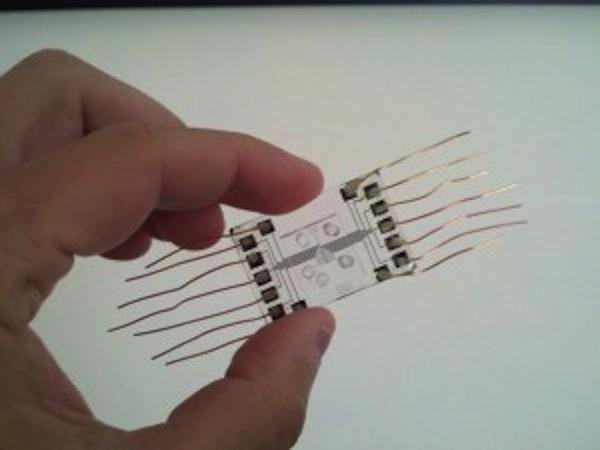A prototype "water chip" developed by researchers at The University of Texas at Austin and the University of Marburg in Germany, in collaboration with startup company Okeanos Technologies. (Credit University of Texas at Austin)
An international team of chemists has introduced a new method for the desalination of seawater that consumes less energy and is dramatically simpler than conventional techniques.
The new method uses a chip to create a small electrical field that removes salts from seawater, and requires so little energy that it can run on a store-bought battery.
“The availability of water for drinking and crop irrigation is one of the most basic requirements for maintaining and improving human health,” said Richard Crooks of The University of Texas at Austin, who led the research with Ulrich Tallarek of the University of Marburg.
Researchers applied 3.0 volts of electricity to a small plastic chip filled with seawater.
The prototype "water chip" contains a microchannel with two branches. At the junction of the channel an embedded electrode creates an "ion depletion zone" that increases the local electric field compared with the rest of the channel.
This change in the electric field redirects salts into one channel, allowing desalinated water to pass through the other.
Crooks and his colleagues have so far achieved 25 percent desalination. Drinking water requires 99 percent desalination, but scientists are confident in their "proof of principle" and say full desalination can be achieved.
The technique, called electrochemically mediated seawater desalination, is patent-pending and is in commercial development by startup company Okeanos Technologies.
“People are dying because of a lack of freshwater,” said Tony Frudakis, founder and CEO of Okeanos Technologies. “And they’ll continue to do so until there is some kind of breakthrough, and that is what we are hoping our technology will represent.”
Right now the water chip's microchannels, produce about 40 nanoliters of desalted water per minute. But the authors are confident the process can scale up to make it practical to produce liters of water per day.
"Okeanos has even contemplated building a small system that would look like a Coke machine and would operate in a standalone fashion to produce enough water for a small village," Frudakis said.















